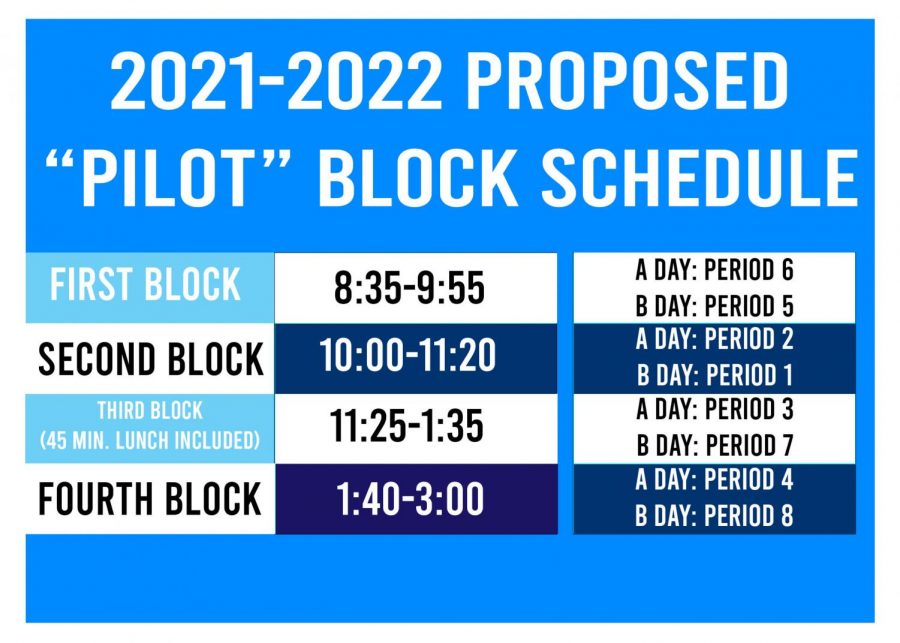EDITORIAL: HIGH STUDENT STRESS, HOMEWORK LEVELS DISPLAY NEED FOR REFORMED BLOCK SCHEDULE
The above schedule was proposed for the 2021-22 school year, but Prospect staff voted to return to the traditional eight-period schedule.
February 25, 2021
Among non-seniors on The Prospector staff, 73.7% are in favor of the following editorial
The coronavirus pandemic has thrown a curveball at American society. In particular, schools across the country were forced to edit every aspect of their typical school day — including their schedules. Prospect is no exception, and every student is aware that our schedule this year is unlike anything we have ever seen before.
We start at 9:50 a.m. instead of 8:15 a.m., we have four periods a day instead of eight and our periods have been extended to 70 minutes instead of the typical 48 minutes. This new block schedule has allowed us students to get more sleep and space out our nightly homework because we do not attend every class each day of the week.
Yes, proceeding with this current schedule does seem like the perfect scenario, but Principal Greg Minter does acknowledge that many teachers have struggled with this new change. Besides the hardship of teaching over Zoom, teachers have had a hard time covering all of the necessary material in their classes because of the more than 30 minutes of lost instructional time each week, according to Minter.
As the number of COVID-19 infections decreases and more and more people in our community are getting vaccinated, the discussion for what going back to normal is going to look like has begun. On Friday’s Institute Day, the District 214 Education Association — a part of the Northwest Suburban Teacher’s Union Local 1211 — will be conducting a vote amongst all D214 teachers to determine the future of each high school’s schedule. Each school will be voting individually — meaning that all six D214 high schools will most definitely have a mix of both regular and block schedules.
According to Minter, the more than 130 Prospect teachers will be the only individuals voting on this matter and not any members of the administration like Minter. Of these teachers, three-fifths of them will need to vote in favor of a block schedule if one is to be implemented. Furthermore, Minter states that there has been a wide variety of ideas among the teaching staff when it comes to next year’s schedule.
For teachers who have shown an opposition to a block schedule, Minter states that the aforementioned loss of instructional time is the leading factor for their decision. On top of this, a block schedule for next year would look much different than the current schedule we have now and some of the required changes could become problematic.
Moreover, Minter said to mention that a block schedule next year would not look like the one we have this year. Rather than a 9:50 a.m. start time, we would begin classes at 8:30 a.m. Rather than 70 minute periods with 10 minute passing periods, we would have 80 minute periods with five minute passing periods.
Additionally, students would have eight periods rather than a usual seven and a lunch period because lunch would no longer be considered a period of the day. As it is this year, lunch would be its own separate entity from the typical eight periods because of how block schedules are laid out.
“A student would have eight periods potentially where classes could fill spots,” Minter said. “There is no way I have the staffing to say that students could fill every one of those slots with classes. I just wouldn’t be able to do it.”
Therefore, Minter states that students would most definitely be placed in mandatory study halls as their eighth period due to the staffing shortage. According to junior Luiza Zanon, mandatory study halls is something that most students — including herself — could benefit from. With a student body that is very active in extracurriculars and are many times taking multiple honors and/or AP classes, Zanon states that this designated 80 minutes for homework every other day could really help lessen student stress.
“Having AP classes is a stressful thing by nature,” Zanon said. “The workload associated with that — like reading in AP Lang or APUSH — [and] being able to have every other day to do work does loads to lessen my stress.”
However, Zanon does understand the concern of many teachers when it comes to the loss of class time. While Zanon has been able to space out her homework over multiple days this year, she states that teachers have been giving her more homework than usual for each of her classes. She attributes this increase in homework to the amount of lost class time each week.
“Being able to have an extra day to do homework has not only allowed me to balance school and extracurriculars well, it allows people with lots of homework in AP classes to have more time and actually just sort of unplug from school,” Zanon said.
Zanon’s complaints about this mass amount of homework are not unique, and we agree with her that reforms to this issue are necessary if a block schedule is implemented. One way we feel this could be done is by having teachers rethink their curricula over the summer to contain only the most necessary information and teach it in a way that does not require as many homework assignments.
We, The Prospector, encourage all teachers to think of the students they educate when they cast their votes this Friday and vote in favor of a block schedule. With a district survey showing that 71% of students and parents find that a block schedule will be beneficial for them, we find that the clear option here is voting to ensure that the will of the student body and community is heard.
We do understand that a loss of instructional time is difficult for teachers to fit their curriculums into, but we find that the flexibility students will be granted and the mandatory study halls will overall benefit student mental health. On top of this, this new schedule would only allow for the loss of 20+ minutes rather than 30+ minutes of instructional time each week — meaning that the loss in time is not as extreme.
Homework and stress levels are far too high amongst our student body, so it is up to our educators to be cognizant of our problems and ensure our schedule is reformed for the better.






















































































